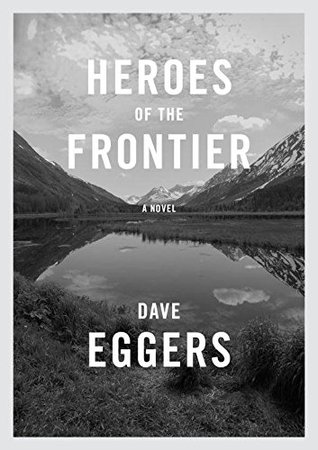But then again, this home, this property, was evidence of the glory of the land, this country. There was so much. There was so much space, so much land, so much to spare. It invited the weary and the homeless like herself, her worthy children. She had the blurry thought that all the world's searching and persecuted could find a home up here. Alaska's climate was warming, was it not? It would soon be a forgiving place, with milder winters and uncountable millions of unpopulated acres, and so many empty homes like this, waiting to take in the desperate travelers of the world. It was a wonderful thought, a numbing notion.
Alaska likes to call itself The Last Frontier. The idea is that, while every inch of the mainland United States has been domesticated, Alaska remains wild, mostly unpeopled, unseen by human eyes. That's reflected in the lack of literature about Alaska--its more likely to attract someone like Christopher McCandless, the subject of Into the Wild, than a novelist like Dave Eggers. It's a place for applied philosophy, not navel-gazing.
Which made it hard to find a book to bring with me on my trip to Alaska two weeks ago. As I've said on this blog many times, I love reading books that are set in the places where I'm traveling. But Alaska, though you might expect its distance and its mystery to be inviting subjects, has very few novels. So when Dave Eggers released his newest novel, Heroes of the Frontier, about a woman from suburban Ohio who escapes to Alaska in an RV with her two children, I did something I never do. I bought a hardcover book at full price.
The protagonist of Heroes of the Frontier is Josie, a dentist escaping personal and professional tragedy in Ohio. Her practice has been sued to oblivion by a woman who developed oral cancer, and she has grown to hate the father of her children, an "invertebrate" named Carl. And--making her decision to run unnecessarily overdetermined--she feels intense guilt over encouraging a young patient to join the military, where he died.
In response, she sets out with her young children, Paul and Ana, to Alaska, where they rent an RV. They follow, strangely enough, the basic route that my friends and I did: beginning in Anchorage, down the Kenai Peninsula to Seward, then the town of Homer, and finally up, up through the interior toward parts unknown. And yet I found these places, at least according to my own experience, difficult to recognize in Eggers' novel. Eggers wants to sell us on the cleansing possibilities of the wilderness, and the idea of frontier, but he has no real feeling for the physical beauty of the Kenai Peninsula, or the staggering visual difference between the mountainous peninsula and the flat, plain-like interior. Eggers' prose is too domestic, more Ohio than Alaska, too prosaic to match the environment. Furthermore, he's infinitely more interested in the people Josie and her children come across, even as he claims that the emptiness of the landscape is somehow transformative.
Heroes of the Frontier is in many ways an antiquated kind of book. It believes uncynically in the possibility of a frontier, and in the Thoreau-like ability of nature to improve us as people. At the novel's climax, Josie and her children become stranded in a lightning storm on top of a mountain, and find their mettle to survive challenged. She has an epiphany: instead of escaping to Alaska to find noble, courageous people, she must try to create them in her children. And despite his attempts to equivocate--the last chapter reads simply, "But then there is tomorrow"--there's no doubt in the sincerity of the faith that Eggers places in the frontier as a place untroubled by commercialism, domestication, and modernity. It's The Call of the Wild, but for people.


No comments:
Post a Comment